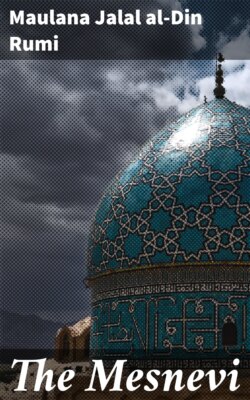Читать книгу The Mesnevi - Maulana Jalal al-Din Rumi - Страница 35
На сайте Литреса книга снята с продажи.
14.
ОглавлениеAs an instance of the great value attached to the poetry of Jelāl, the following anecdote is related:—
Shemsu-’d-Dīn Hindī, (Prince of Shīrāz in the province of Fars, Southern Persia), wrote a flattering letter to the renowned poet, Sheykh Sa’dī, of Shīrāz (who lived A.H. 571-691, A.D. 1175-1291, and was consequently a contemporary of Jelāl’s), begging him to select the best ode, with the most sublime thoughts, that he knew of as existing in Persian, and to send it to him, for presentation to the great Khān of the Moguls (who then ruled over nearly all Asia).
It so happened that the ode by Jelāl had just become known at Shīrāz, which commences:—
“Divine love’s voice each instant left and right is heard to sound,
We’re bound for heaven. To witness our departure who’ll be found?”
This ode had captivated the minds of all the men of culture in the city; and this ode Sa’dī selected, wrote it out, and sent it to the prince, with the remark: “A monarch, of auspicious advent, has sprung up in the land of Rome, from whose privacy these are some of the breathings. Never have more beautiful words been uttered, and never will be. Would that I could go to Rome, and rub my face in the dust under his feet!”
The prince thanked Sa’dī exceedingly, and sent him valuable presents in return. Eventually, Sa’dī did go to “Rome,” arrived in Qonya, and had the gratification to kiss the hand of Jelāl. He was well received in that city by the dervish circle.
The prince was himself a disciple of Sheykh ... ’d-Dīn, of Bakharz (in Khurāsān, about midway between Tūrshīz and Herāt), to whom he sent a copy of the ode, to learn what the Sheykh would think of it. All the learned men of Bakharz assembled round the Sheykh. He read the ode attentively, and then burst out into exclamations of the wildest delight and most fervid admiration, rending his garments, and acting as though mad. At length he calmed down and said: “O wonderful man! O thou champion of the Faith! Thou pole of the heavens and of the earth! Verily, thou art a wonderful Sultan, who hast appeared on earth! In good sooth, all the Sheykhs of bygone ages who were seers, have been frustrated in not having seen this man! They would have supplicated the Lord of Truth to allow them to meet him! But it was not to be; and this mercy will last until the end of time, as has been sung:—
“A fortune, by the men of ancient times in dreams long sought,
Has been vouchsafed to modern men; without their efforts caught.”
“One ought to put on ironed shoes, and take in hand an ironed staff, to set out at once and visit this great light. I make it a legacy to all my friends to do so without the least delay, if they have the means and the strength, so as to achieve the happiness and secure the honour of making the acquaintance of this prince, so obtaining the grace and favour of hearing him. His father, Bahā Veled, and his ancestors, were great Sheykhs and most illustrious; their great progenitor having been the first Caliph, Abū-Bekr, the glorious Confirmer of the truth spoken by the Apostle of God. I am myself old and infirm, unequal to the fatigues of travel. Otherwise, I would have walked, not on the soles of my feet, but on the tips of my great toes, to visit that eminent man.”
The Sheykh’s eldest son, Muzahhiru-’d-Dīn, was there present. To him the Sheykh addressed himself, saying: “My son, I do hope that thy eyes will behold this sacred visage; and, if God so will, convey to him my salutation and my respects.”
After the death of the old man, his son went to Rome, had the felicity to see Jelāl, and presented his father’s message. He returned to Bakharz; but it is said that a son of his lies buried at Qonya.
